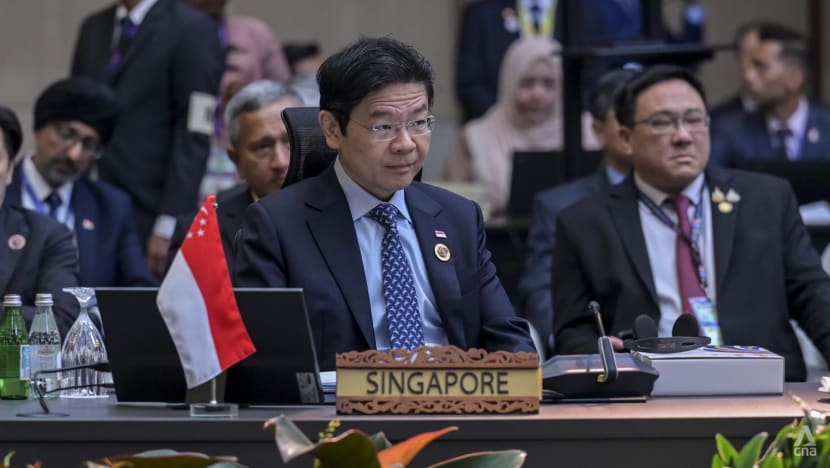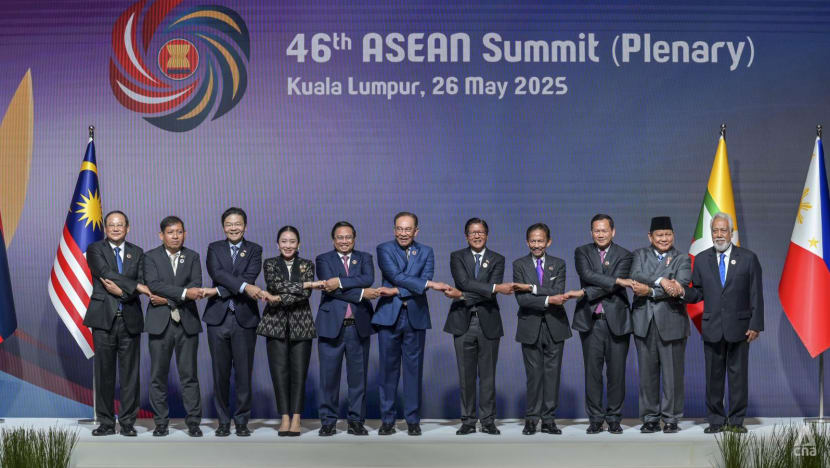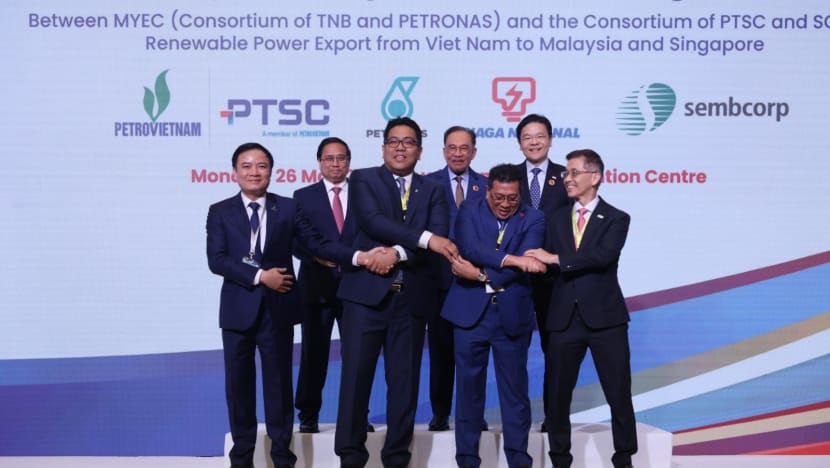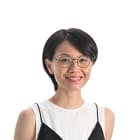ASEAN can aim for 100% tariff-free trade to boost integration efforts, says PM Wong
The regional bloc can also do more to deepen ties with its external partners, said Singapore's Prime Minister Lawrence Wong on Day One of the 46th ASEAN summit.

Singapore Prime Minister Lawrence Wong at the 46th ASEAN Summit. (Photo: CNA/Fadza Ishak)

This audio is generated by an AI tool.
KUALA LUMPUR: The Association of Southeast Asian Nations (ASEAN) should go further in its integration efforts, including aiming to be "100 per cent tariff-free" within its free trade area, said Singapore’s Prime Minister Lawrence Wong on Monday (May 26).
The 10-member regional bloc should also deepen collaboration with external partners, both existing and new, amid an increasingly challenging global environment, Mr Wong said on the first day of the 46th ASEAN Summit in Kuala Lumpur.
Southeast Asian leaders have gathered in the Malaysian capital for the first of two ASEAN summits chaired by Malaysia this year.
The meeting is taking place against the backdrop of heightened geopolitical tensions and economic uncertainties, with the impact of United States President Donald Trump’s tariff blitz on the trade-dependent region high on the agenda.
Speaking at the leaders’ retreat session, Mr Wong said the US tariffs marked "a retreat from multilateralism and a move towards more transactional and bilateral deals, where unfortunately often it becomes might being right".
"In such an environment, it would be more difficult and challenging for countries everywhere."
Mr Wong noted that ASEAN can do three things to respond to this new environment.
One is to continue to "constructively engage the US, individually as countries but more importantly, collectively as ASEAN". Another is to strengthen its integration efforts.
"For example, we said that the ASEAN free trade area is virtually tariff-free, which is very good. But why can’t we be 100 per cent tariff-free?"
First established in 1992 and encompassing three agreements, including the ASEAN Trade in Goods Agreement (ATIGA), the ASEAN free trade area aims to reduce trade barriers and create a single market within the regional bloc.
ATIGA, for one, has eliminated tariffs on 98.6 per cent of products traded within ASEAN.
Ahead of the summit in Kuala Lumpur, ASEAN economic ministers concluded negotiations to upgrade the ATIGA, which they said will create an improved regional ecosystem for the flow of goods within the region.

Mr Wong said ASEAN also needs to address non-tariff barriers, such as import licensing requirements and complex customs procedures, as well as go beyond trade in goods to accelerate trading in services.
As part of making ASEAN a more attractive and competitive investment area, the regional bloc must ensure that agreements that have been agreed upon are implemented in "a timely manner", he added.
"My officials found that there are 24 economic agreements that have still not been implemented, even though they have been agreed upon. Some were agreed as early as 2015," the Prime Minister said.
"Clearly, there is still a lot of room for us to improve in terms of implementation, execution and strengthening our integration even in existing areas of goods, services and investments."
Mr Wong also called for ASEAN to step up integration in new growth areas, such as the digital economy and the establishment of a regional power grid.
In addition, the regional bloc must deepen external partnerships by continuing to enhance existing trade pacts and strengthening its relationships with other regional economic groupings, such as the 12-country Comprehensive and Progressive Agreement for Trans-Pacific Partnership (CPTPP).
Currently, six ASEAN members – namely, Cambodia, Indonesia, Laos, Myanmar, the Philippines and Thailand – are not part of the CPTPP.
"We welcome more ASEAN countries to be part of the CPTPP," Mr Wong said.
When it comes to expanding ASEAN’s network of economic ties, Mr Wong cited the European Union (EU) and the Gulf Cooperation Council (GCC) as two important strategic partners. The GCC has a membership of six Arab states, including major oil producers Saudi Arabia, the United Arab Emirates and Kuwait.
"For example, strengthening our links with the EU through the CPTPP would be a significant advantage. Through ASEAN and the CPTPP, if we can strengthen our links with the GCC, that’s also a tremendous plus," he said.
When combined, ASEAN, CPTPP, the EU and the GCC will make up "a significant part" of the world economy.
"If together, we can push back and uphold a rules-based trading system, that would enable us to strengthen multilateralism and make our overall economic foundations a lot more robust and resilient," he added.
Touching on the same point at the plenary session on Monday morning, Mr Wong said ASEAN could explore new partnerships in more flexible ways.
For countries who may not be ready to become formal partners, engagements can be done for specific areas where there is mutual interest, he suggested.
MYANMAR
Turning to the situation in Myanmar, Mr Wong extended his appreciation for Malaysia’s leadership of ASEAN’s response to the massive earthquake that struck Myanmar on Mar 28.
He added that Singapore continues to stand ready to augment ASEAN’s humanitarian support for Myanmar.
Singapore also joins others in calling for an extended ceasefire, which he said "could be one step in the road" to a long-term solution for the ongoing political crisis in Myanmar.
"We know that successive chairs have tried to find a way forward for Myanmar and move things in the right direction," said Mr Wong.
"Unfortunately, progress has been slow. The issues are complex and it’s very difficult to find a way forward but we should still continue to engage, as Indonesia had suggested."
In the meantime, ASEAN should continue to uphold the Five-Point Consensus and decisions taken to maintain Myanmar's non-political representation at the regional grouping’s summits.
The consensus, agreed upon by ASEAN leaders in April 2021, outlines key steps towards a peaceful resolution of the situation in Myanmar, including the cessation of violence, inclusive dialogue, and humanitarian assistance and the Leaders’ decisions on Myanmar.
"This is important for ASEAN’s credibility, especially with our external partners," said Mr Wong.

The summit marks Mr Wong’s first overseas engagement since he led the People’s Action Party to victory in the May 3 General Election.
In his intervention delivered at the summit's plenary session, he thanked fellow leaders for their warm wishes on the election results.
"I am deeply grateful to my fellow Singaporeans for their confidence and trust in me and my team, which is the reason why I’m able to join you here today," he said.
The Prime Minister arrived in Kuala Lumpur on Sunday night, accompanied by his wife, Ms Loo Tze Lui.
He is joined by Foreign Affairs Minister Vivian Balakrishnan and other officials.
On the sidelines of the summit and related meetings on Monday, Mr Wong held bilateral meetings with Malaysian Prime Minister Anwar Ibrahim, Indonesian Prime Minister Prabowo Subianto and Kuwait’s crown prince, Sheikh Sabah Al-Khaled Al-Sabah.
He also witnessed the signing of a joint development agreement to explore the export of renewable electricity from Vietnam to Malaysia and Singapore.
Under the agreement, major power companies in the three countries will look to export green electricity via a new subsea cable.
The companies involved are Malaysia’s Tenaga Nasional Berhad and Petroliam Nasional Berhad, Vietnam’s PetroVietnam Technical Services Corporation and Singapore’s Sembcorp Utilities.


















